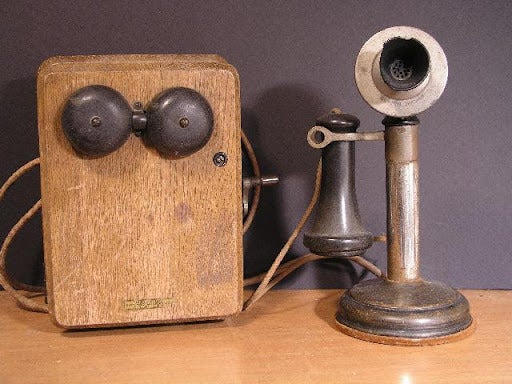AT&T continues to reduce its copper footprint (UPDATE)
AT&T still needs to get approval from California to discontinue its copper network in the state.

UPDATE-AT&T has reached out to make a correction to the following story. The company plans to exit the majority of its copper footprint by 2029, not exit it completely as originally written. We regret this mistake.
The original story is as follows:
Believe it or not, there was a time when there were no mobile phones, no cell towers, and pay phones dotted the big cities. Families had a landline and one to three phones, depending on how many people lived at a specific address. If one wanted sports scores, the weather, stock market news, or the news from around the world via his/her phone, a call could be made to specialty phone lines. For example, in New York, there were numbers like Sportsphone (976-1313) that charged a premium price per minute to hear a pre-recorded tape with the latest scores.
AT&T receives approval from the FCC to stop using copper in about 500 wire centers
While we've come a long way since then, some of the older technology remains and is slowly being shut down. AT&T, the company associated with providing phone service in the U.S. since 1885, has received approval from the FCC to stop using its copper services in about 500 wire centers. That represents about 10% of the company's legacy copper network. The company was incorporated as a subsidiary of Bell Telephone, which was founded in 1877 by Alexander Graham Bell.

An antique telephone. | Image credit-PhoneArena
AT&T's plan is to completely shut down its legacy copper network by 2029. The popularity of cellphones and smartphones in particular, combined with the availability of affordable wireless plans from pre-paid MVNO wireless providers, has made it possible for as much as 92% of the adult population in the U.S. to own a smartphone. Back in 2011, that percentage was 35%.
In March, the FCC started the process to speed up the task of retiring the copper networks that were used to carry phone calls for so many years. This task required AT&T to go through certain processes, as it couldn't simply flip a switch to turn off its legacy copper networks and switch to a new technology. Every state had to be approached and asked to approve the discontinuation of copper networks.
The replacement for copper networks might be be fiber, fixed wireless access (FWA), or AT&T’s landline phone replacement called Phone Advanced. The latter is a home phone replacement that delivers digital voice-over-IP (VoIP) home phone service via an internet connection instead of copper wires. AT&T needs to show the FCC that Phone Advanced will do the things that consumers need the copper replacement to do, such as work with fax machines and medical equipment.
Susan Johnson, AT&T’s Executive VP and general manager of Wireline Transformation and Global Supply Chain for the company, says that some customers are concerned that if AT&T eliminates copper networks, their existing equipment will not work. This is not true, and Johnson says that these concerns are coming from customers in a certain age demographic, "where they don’t understand technology as well." These consumers are afraid that losing copper means that they will lose the ability to make and take calls, and won't be able to call 911 in the case of an emergency. This is not true.
Only 3% of AT&T customers are still using a copper network
Only 3% of AT&T's customers are still using the company's copper services. In some of these markets, AT&T doesn't have wireless coveerage and can't offer the customer its Phone Advanced service. Johnson says, "So for some of those customers, we ultimately may be looking at satellite or other connectivity to make sure we meet that pledge of no customer being left behind without full access to 911 and voice services."
Should AT&T be able to shut down all of its copper networks?
Yes. Copper networks are well in the rear-view mirror.
50.52%
No. Some markets continue to need copper networks.
45.36%
It doesn't affect me, so why should I care?
4.12%
The first areas where AT&T is looking to cut out copper are the "wireless-first" markets where residential fiber is not being deployed. By the end of 2027 AT&T hopes to have no more subscribers using copper in those areas. But not all of the states have approved AT&T's plans to drop the use of copper. California is one, for example. AT&T is considered the Carrier of Last Resort (COLR) in the state, which means it must provide consumers with a landline in certain areas if they request it.
California last year refused to allow AT&T to drop its COLR designation in the state because the carrier failed to find another phone company to become the COLR in the state. "We are still working with the California policymakers as well as the [Public Utilities Commission] there to define our path to get the state level relief," AT&T's Johnson said.
Follow us on Google News













Things that are NOT allowed:
To help keep our community safe and free from spam, we apply temporary limits to newly created accounts: